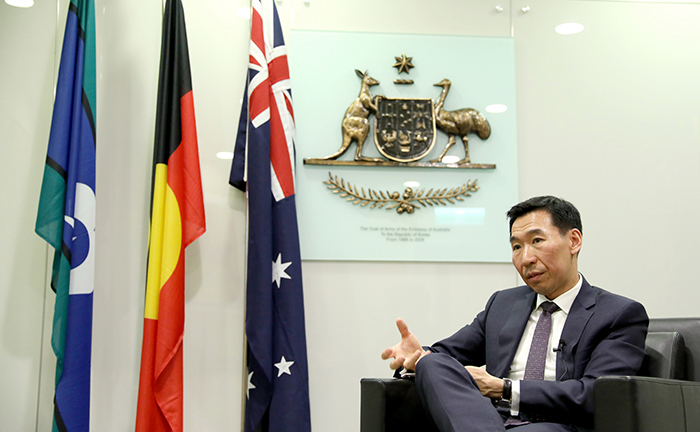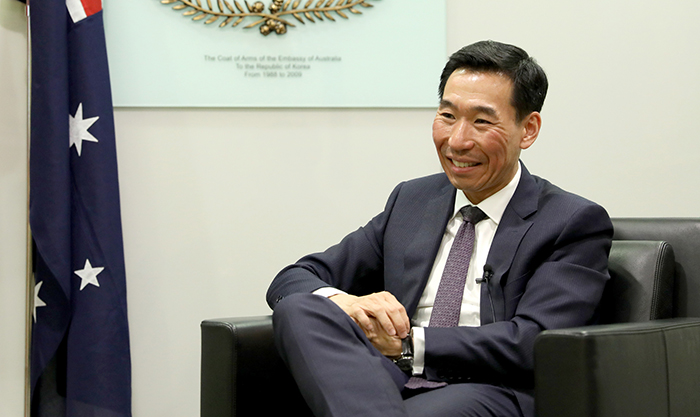Contributions From Experts
Dialogue matters most for 2018 Inter-Korean Summit: Australian ambassador
Apr 19,2018| The world has been showing great interest in the upcoming 2018 Inter-Korean Summit. Media outlets from around the globe are covering stories related to the Korean Peninsula, visiting the Peace House summit venue in Panmunjeom, the Demilitarized Zone, and interviewing displaced people who have had to flee their original homes in the North. In line with this, Korea.net is meeting with diplomatic envoys to Seoul to learn more about their perspectives on the upcoming Inter-Korean Summit. |
By Yoon Sojung and Jung Joo-ri
Photos, video = Kim Sunjoo
Seoul | April 17, 2018

Australian Ambassador to Korea James Choi hopes that the 2018 Inter-Korean Summit can lead to more dialogue between the two Koreas so that it can develop into denuclearization negotiations.
Australian Ambassador to Korea James Choi said on April 17 that the upcoming 2018 Inter-Korean Summit holds great significance, as it represents the start of dialogue between the two Koreas.
Ambassador Choi said, “The opportunity that the South Korean government has used, especially during the PyeongChang 2018 Olympic and Paralympic Winter Games, has been a great diplomatic initiative, as it has opened up the prospects of inter-Korean dialogue and this summit.”
“We hope that the upcoming Inter-Korean Summit really starts a process of dialogue to discuss denuclearization,” said Canberra's top diplomat in Korea, pointing out that, “The upcoming inter-Korean talks have already had an effect on the other summit between Washington and Pyeongyang.”
Although Ambassador Choi mentioned the importance of being realistic about any potential outcome of the South-North talks in the short term, he also hoped that the Inter-Korean Summit “will lead to a long-term process of negotiations and critical negotiations that change North Korea's calculations.”
“What we need is a sense of dialogue, mutual trust and understanding each other’s positions,” he said. “This will lead to a sense of trust-building, ongoing dialogue, and lead to denuclearization.”
Ambassador Choi is the first ever Korea-born Australian to represent Canberra in Seoul, and is also Australia's ambassador to both South and North Korea.
Korea.net sat down with him to learn more about his views on the 2018 Inter-Korean Summit.

Australian Ambassador to Korea James Choi said on April 17 that forging a sense of dialogue and trust-building between the South and the North are the most important tasks for the establishment of peace and denuclearization on the peninsula.
- How did the Australian government and its people react after hearing the news about the next Inter-Korean Summit?
We welcomed the announcement that there would be a South-North summit. Looking back at this time last year, the tensions on the Korean Peninsula were very high. Now, we’re looking at the prospect of President Moon meeting Kim Jong Un in Panmunjeom on the southern side. I think that's a significant development. We also welcome the possibility of moving forward with discussing denuclearization.
- What expectations and prospects do you have for the Inter-Korean Summit?
Firstly, it's the prospect of opening up inter-Korean dialogue. The mood on the Korean Peninsula has changed dramatically after the PyeongChang 2018 Olympic and Paralympic Winter Games, which has led to the restart of inter-Korean talks.
We want a reduction in tensions. We want a sense of dialogue with North Korea. That could lead to a discussion on denuclearization, convincing North Korea that its safety and security can be guaranteed not by possessing nuclear weapons and missiles, but by engaging the international community, and adhering to international law and also the requirement of disarmament and denuclearization.
- What do you think is the top priority for the establishment of peace and denuclearization on the Korean Peninsula?
It is a sense of continued dialogue. There's a better future for North Korea when it gives up nuclear weapons and its missile program.
We want that sense of dialogue to develop, and that North Korea realizes it has a better future for its people if it works with South Korea, and works with the United Sates, and mainly the general sense of concern about North Korea's missile and nuclear programs.
- If you were to send a message of hope and success for the 2018 Inter-Korean Summit, what would it be?
Although the war was over in 1953, the fact that Korea remains divided in 2018 is really a tragedy, it's a humanitarian tragedy. The division of the Korean Peninsula is a legacy of the Cold War and a legacy of the Korean War.
I'm very much hoping that the 2018 Inter-Korean Summit could lead to a sense of hope for the Korean people, that there's a better future, and that there will be a prospect for unification.
I also hope for the North Korean people, that they can see the opportunities of engaging with the world, not living in isolation.
I hope the upcoming summit will lead to a lasting process of discussion and negotiation, and that it will help to develop a commitment from North Korea to start the process of denuclearizing as part of its approach to the world.
arete@korea.kr